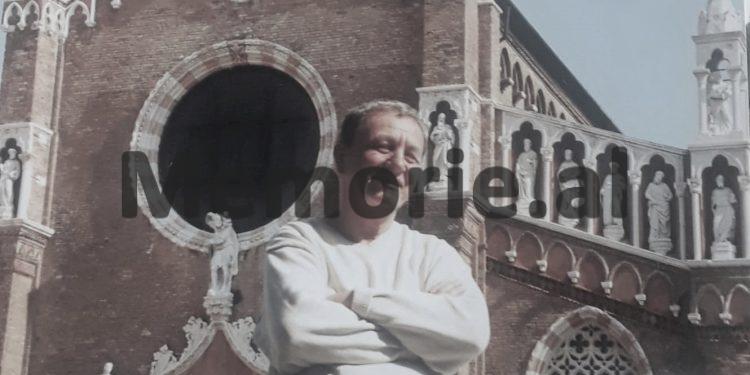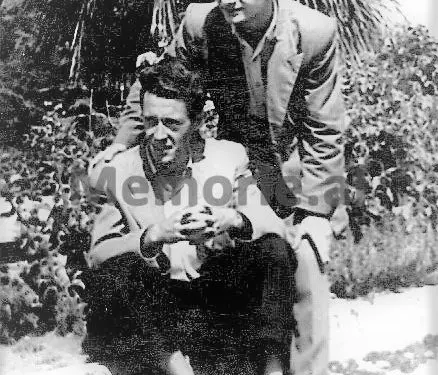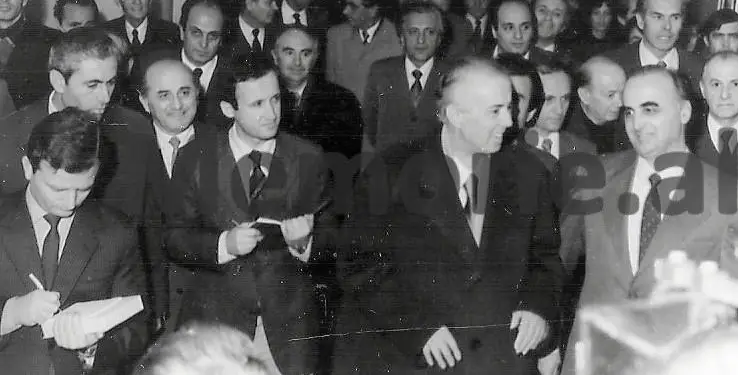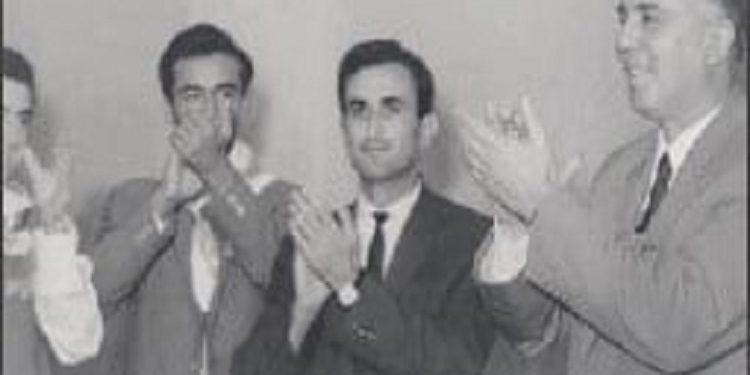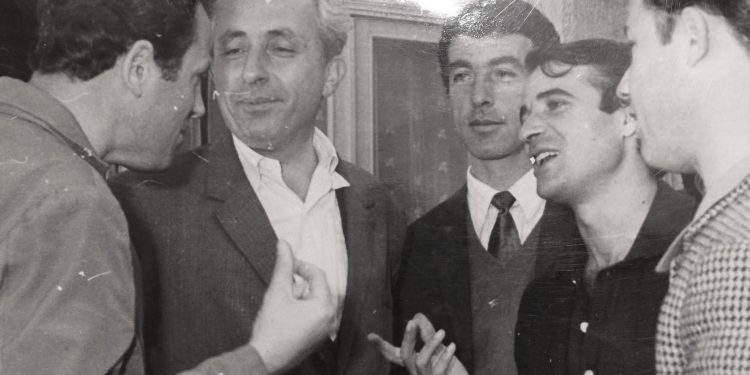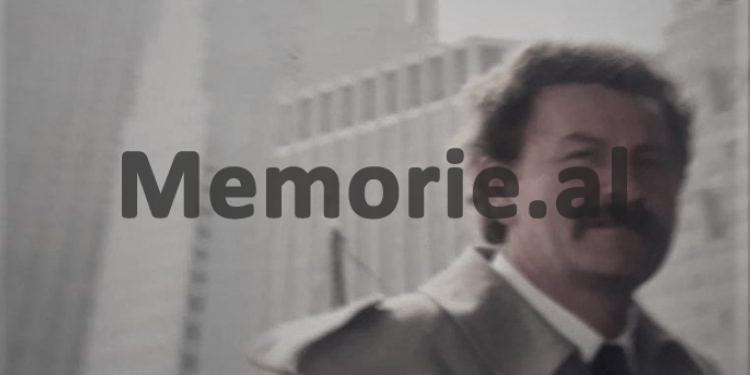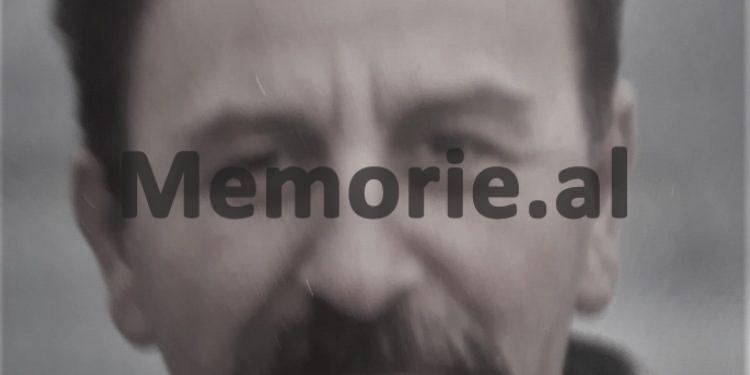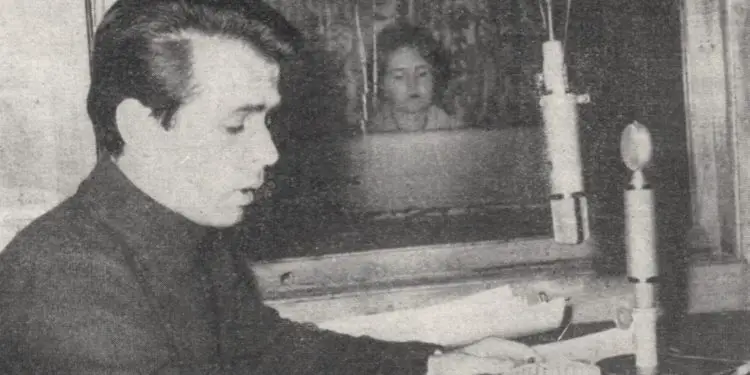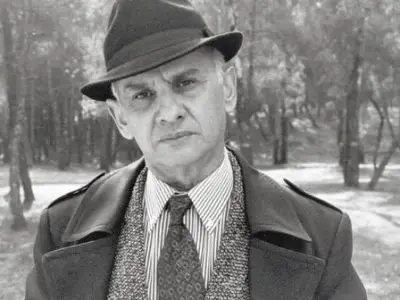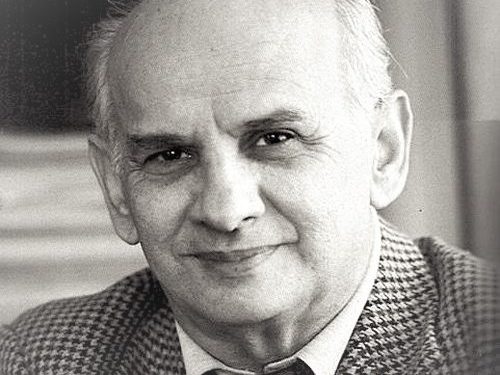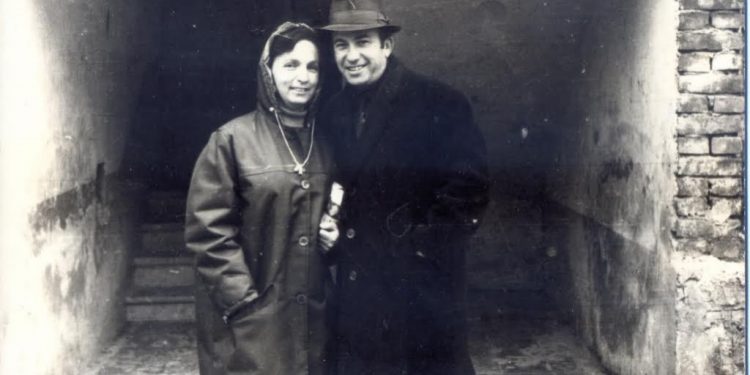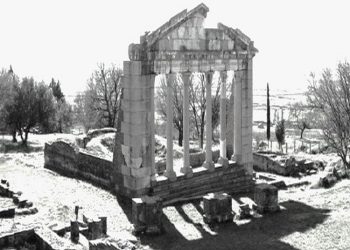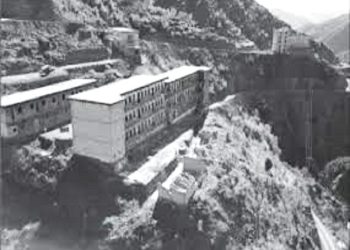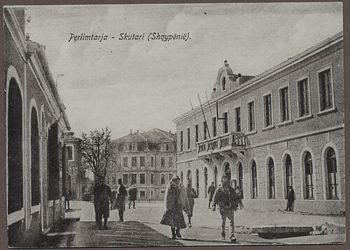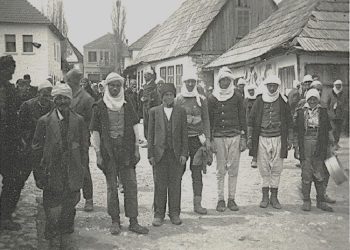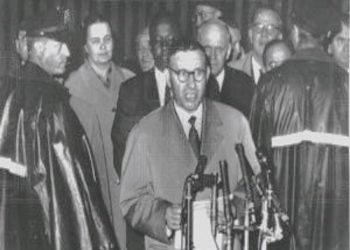By Bashkim Trenova
Part twelve
Memorie.al publishes the memoirs of the well-known journalist, publicist, translator, researcher, writer, playwright and diplomat, Bashkim Trenova, who after graduating from the Faculty of History and Philology of the State University of Tirana, in 1966 was appointed a journalist at Radio- Tirana in its Foreign Directorate, where he worked until 1975, when he was appointed as a journalist and head of the foreign editorial office of the newspaper ‘Zeri i Popullit’, a body of the Central Committee of the ALP. In the years 1984-1990, he served as chairman of the Publishing Branch in the General Directorate of State Archives and after the first free elections in Albania, in March 1991, he was appointed to the newspaper ‘Rilindja Demokratike’, initially as deputy / editor-in-chief and then its editor-in-chief, until 1994, when he was appointed to the Ministry of Foreign Affairs. with the position of Press Director and spokesperson of that ministry. In 1997, Trenova was appointed Ambassador of Albania to the Kingdom of Belgium and to the Grand Duchy of Luxembourg. Unknown memories of Mr. Trenova, starting from the war period, his childhood, college years, professional career as a journalist and researcher at Radio Tirana, the newspaper ‘Zeri i Popullit’ and the Central State Archive, where he served until the fall of the communist regime of Enver Hoxha, a period of time when he in different circumstances became acquainted with some of the ‘reactionary families’ and their sucklings, whom he described with a rare skill in a book of memoirs published in 2012, entitled’ Enemies of the people ‘and now brings them to the readers of Memorie.al
Continued from the previous issue
Enemies of the people
How did Robert Zhvarc defend me when I was attacked accusing me of being an accomplice of Todi Lubonja?!
Kiço, Dhori and Hasani, as well as many others on all Radio Television, would receive the flag of the fight against liberalism, would be removed as victims, as heroes that the liberal director of this institution, Todi Lubonja, had wanted to eliminate that they were loyal to the Party etc., etc. For me, Dhori Nini said that I had served as a conscious or unconscious mass of Todi Lubonja, meanwhile declared an enemy of the Party and the people. According to Hasan Pinci, who strongly trumpeted the existence of a conspiracy on Radio, I was instructed by Nefo Myftiu for my criticism of him and others. According to Hysen Pojani, the proposals that were made in the collective for the circulation of some leading cadres of Foreign Radio were made according to some lists prepared by Todi Lubonja and Nefo Myftiu. It went to extremes beyond any logic. I was accused of being a conspirator, comparing myself to Koxi Xoxen shot by the Party as a traitor and an enemy.
They were the ones who not long ago proposed and approved me to be decorated with the motivation – “In defense of the Party line”. They were the ones who had made me a characteristic of envy. It was Hasan Pinci who had proposed me to become the head of the editorial office and who had assigned me to do the duty of the head of the editorial office in his absence. They unanimously approved my candidacy to become a member of the Labor Party. It was Kiço Pandeli who servilely removed the tobacco ashtray from Todi Lubonja, accompanying this gesture with the words: “You should not smoke, comrade Todi, because it hurts your health”. I said all this at the meeting of the Foreign Radio team, dedicated to the fight against liberalism. I also said that today’s “heroes” are speculators. I responded nervously to the provocation of Vasil Rali, a foreign radio editor, who followed the refrain of those who could hardly bear to settle accounts with me, calling me a “collaborator” of Todi Lubonja. I called Vasil Ralin “blackguard “, “blackguard”, ” blackguard “.
Of course I should not have said so, although even today after nearly 40 years, I do not regret saying those words because he deserved it and others like him. Kiço, Dhori and others, wanted to be caught after this insult I made to Vaska, to justify their last blow to me Erred. In the hall they were not supported. I remember Robert Schwartz, a German translator, who stood up and said abruptly, “Let’s not just stick to the words of the Union, but let’s see first why the Union said those words.” The reference was clear, I was provoked.
I have always appreciated as very courageous, especially for the moment as well as for his own position, the words of Robert Schwartz in this meeting of the Radio-Television collective. I knew at the time that Robert Schwartz also had a stain on his biography, although I did not know exactly how and how he “deserved” it. During the years of democratic transition in Albania, Nazif Bezhani, a lawyer, has published a book entitled “Sinners”, calling such collaborators State Security. In his book he mentions one of them, who, as Bezhani writes, “had discovered in the Higher Pedagogical Institute a hostile activity, which was led by a group of students dissatisfied with the socialist regime.” Among the 3-4 names of “leaders” mentioned on this occasion, is that of Robert Schwartz. The Minister of Interior, Kadri Hazbiu, had informed the dictator Hoxha himself about this “group”.
The story of my friend, Enver Muça, how Robert Zhvarc was followed and monitored!
My friend and his friend, Enver Muça, told me the most complete truth about the pursuit of Robert Schwarz by the State Security. When I started writing these notes, I asked Enver to help me by bringing me some memories about Robert Schwartz. What he sent me by e-mail, I am giving in full.
“In 1979, writes Enver Muça, I worked in the Directorate of Internal Affairs in Tirana or otherwise: the Directorate of Tirana. I did the Party internship there. In the sector where I worked, the first day I started working, I came across a file with which I had to take (along with 10 or 12 others) .On its faded lid, I tore my eyes when I read: “Robert Schwartz”. Of the work of that time, the file was sometimes “lowered” to a second level and sometimes “raised” to the first level, that is, to what was called “high risk”. Potential foreign service »- so as the spy of the Germans, but also of the Israelis…! Dear union! I have no interest in selling my mind, or appearing, but for the sake of truth, let me tell you – I did my best to reduce Bert’s case to a category. As a result, Berti was summoned to the Tirana Party Committee (by the secretary of this Committee, Xhelil Gjoni, as far as I remember), where he was advised and thus escaped from possible imprisonment. I was held hostage that I did not tell him this fact while he was alive. But he was so smart and understood my action. Do not forget that Berti also had krushk. “Bert’s sister is the wife of a son of my aunt, who has been living in Israel for about 19 years.”
There were not many people who, even being targeted by the dictatorship, dared to stand up to tell the truth, to say what they thought, as Bert Schwartz did in the meeting of the Radio Television collective. It took a lot of strength, a lot of character. Such was Schwarz and being such, he could not be pampered by the dictatorship; he was and was seen as its opponent.
I worked with Robert Schwarz for several years on Foreign Radio, me as a journalist and he as a translator for the German show. I remember with his portrait unchanged, a small Republican hat on his head and a cigarette “eternally” unquenchable, like a mini Olympic flame, and hanging on his angry lips.
Zvarc’s ‘conflict’ with his colleague on Radio, when about the Arab-Israeli war!
Bert was as loving and compassionate as he was angry and sometimes explosive. Being of Jewish origin, he was teased, teased, laughing with Tahir Pollozi, the Arabic translator who was either originally from the Albanian colony of Egypt, or had something Arabic of his origin. This kind of humorous “spectacle”, they did not spare us and gave it to us, even in abundance, during the six-day Israeli-Arab war of 1967. Both even spoke in the respective German and Arabic shows. The events on the war front unfolded quite rapidly. It is possible that one of them entered the recording studio to record the news of the victory of “his” army and left it leaving the place to the other, who now had the turn to read the news of the victories of “his” army. . We rejoiced in the victories and defeats of Bert and Tahir as well as the two of them themselves, who were good friends. At one point, in order not to accept the defeat, which did not belong to him, Bert Schwartz refused to translate a news item that spoke of the victories of the Arab armies. In fact, the Arab armies at that time were in retreat.
The work of the translator at Radio Tirana, Bert Shvarci did as a hireling, forced. Verses were suppressed in his soul, which he would never publish, because as he wrote on the cover of the notebook where they were written, the dictatorship of the proletariat”.
I would have known Robert Schwarz over the years, like my whole generation, not only as a talented poet, but also as an incomparable Albanian. He made personalities of world literature such as: Erich Maria Remark, Goethe, Heine, Schiller, Brecht, Tucholsky, Weinert, Fallada, Remarque, Zweig, Lion Fojtvanger, Bertolt Breht speak Albanian. With this gigantic work, he gave a very powerful help in destroying the “sanitary” cordon through which communism isolated the Albanian people and culture. He is thus in fact one of our predecessors, who put strong blocks in the construction of the European spiritual integration of the Albanian people.
During the years of dictatorship, Berti allowed us to secretly read “The Arc of Triumph” and any other translation that the dictatorship refused to publish. After the overthrow of communism, Schwarz was honored on May 26, 1995, by German President Roman Herzog with the “Cross of Merit”, known as Germany’s first decoration for the East. Then the leaders of “democracy” in Albania remembered to honor him with honorary titles, to forget him again and not to say a word at his grave. Thankfully there are very, very far from them the common people, his friends and colleagues, who have always known and know how to honor him.
When I decided to write these lines I also asked an old friend of mine, with whom we worked together on Radio, to remind me of something from my years of working with Robert Schwarz. He sent me an e-mail where, among other things, he wrote: “I have had the opportunity to spend years through Germany. We also stopped in Osnabrück, where, by chance, I learned that it was the museum of Erich Maria Remark, this writer very dear to our generation, who came to us thanks to Bert’s translation of “Three Friends”, but also the works others translated by Bert in the 1960s. There I also saw some books in Albanian and I left a note in the book of impressions, where I also mentioned Bert, as a tribute to him. I was even when the 70th anniversary was celebrated even at his death and I remember that there were, in both cases, many people “.
Bert Schwarz’s few words at the Foreign Radio collective meeting, dedicated to the fight against liberalism, I certainly felt as a support, as an encouragement not to weaken. Thus, in the continuation of the meeting of the collective dedicated to the IV Plenum of the Central Committee, I remembered that my criticism of the leaders of the Foreign Radio began in the first years of work in this institution, when the general director was Thanas Nano and when it was not even known if one fine day, Nefo Myftiu and Todi Lubonja would be appointed respectively: director of Internal Radio and general director of the Albanian Radio Television. I also recalled, on this occasion, that after three years of work, ie in 1969, I had sent a written request to the staff office at the General Directorate of Radio and Television, through which I expressed my desire to leave this institution because of “difficulties not so much at work, but in relations at work”. In this request I emphasized that: I have tried “often to start once again, once again trying to find the same desire for work … Forced so many times, now I cannot anymore”. I mentioned that Thanas Nano called me, talked to me and told me that my request was not accepted. “Now, I said, I face the same problems, which have nothing to do with liberalism, but with concern for the work and propaganda of the Party.”
How did director Thanas Nano criticize me for leaving a mustache and smoking a pipe?!
I was once criticized by Thanas Nano because, for a few days, I had let my mustache grow. Not only that, but also because I smoke pipe. We met him one day on the steps of the institution. He did not spare words. To him, my mustache and pipe were “snobbery” shows! To get rid of this annoying label, even politically for the time when proletarian simplicity was required, I told Thanas Nano that Stalin also drank pipe, so wasn’t he a snob too? Close-knit Thanas quickly clarified that Stalin had smoked with a pipe, but not with a pipe with a lid. Here I was not sure. As soon as Thanas Nano left, I ran down the hall to meet Valian. She was the wife of Thimi Çollaku. They met together in the Soviet Union, where Thimi had been a student of political science. I asked Valian if Stalin had smoked a pipe with a lid or without a lid?! Valia assured me that Stalin had used both the pipe with the lid and the one without the lid. This calmed me down somewhat. Mustaches remained, however. I did not tell Thanas that Stalin also had a mustache!
A few years after this meeting with Thanas Nano, I had to make an in-depth self-criticism of my mustache at the meeting of the collective dedicated to the IV Plenum of the Central Committee of the Party, which was no longer treated as a show of “snobbery”, but as a “liberal” show. In this self-criticism I admitted that: “I also had, both in appearance and at work, flaws, performances that can be described as liberal. So it may be, for example, the whim of wearing a mustache for a few days in a form that can be found in Chinese mandarins, Zaporozhians, democratic revolutionaries in various countries, perhaps perhaps in left-wing Western intellectuals, or even to the warriors of Skanderbeg, but not in our day to us. “Although a fad for a few days and not a liberal taste, tendency or predisposition, I should not allow this to happen to me.”
All this today may seem like an absurd comic scene, but in those years absurdity was a moral, ideological and political norm. We were all absurd characters of an absurd reality, of an absurd society. Today I am not able to judge whether I was honest in this self-criticism, I was shy or just ironic, dismissing myself as honest!
After I also explained about the mustache, I had to reject the accusation according to which I, according to the tasks assigned by Todi Lubonja, wanted to liberalize Radio Tirana shows abroad, that is, to sabotage the proletarian revolution in the world, mission the one who had undertaken to be led by our dictator, who thought, perhaps, that he would go down in history as the fifth classic of Marxism after Marxism, Engels, Lenin and Stalin.
Specifically, I was criticized because about a year ago, in the section “Answers to letters from foreign readers”, I had broadcast a song from Albanian light music. The song was titled “Lemon Flowers”. This was a happy song that was broadcast by Radio Tirana in its music shows, so it was not part of the black fund of the Radio’s library. The song itself was not a problem. The “crime” I had committed was that in the shows abroad, I had introduced for the first time in their history a song of light music. In the bourgeois-revisionist world, as it was called at the time in official propaganda the whole globe, excluding Albania, the proletariat, the true democrats, the oppressed peoples saw the revolution no longer simply as an aspiration, but as a problem posed for solution. Thus, revolutionary music had to play its part or, better yet, it also had its role. With the song “Lemon Flower”, I had moved it; I had undermined its historic mission!
I had to explain that light music in itself is neither liberal nor counter-revolutionary. I also had to find an acceptable argument. “We, I added, sometimes say why foreign radio stations do not broadcast our music? This is because they do not care, because such a thing does not correspond to the aims and interests of the bourgeoisie. Then, I thought, why don’t we broadcast this beautiful music »?!
Remembering all these moments of my life today, it seems to me a real madness, but we also lived in a madman. Even my courage was insane, as was my insane belief in the Party.
The struggle of the leaders of the Foreign Radio, not to accept me in the Party?!
What they could not achieve in the meeting of the Foreign Radio collective, the ‘troika’, they tried to achieve outside the walls of the Radio, where I did my internship, in the Construction Vehicle Office, otherwise OAN, but now out of my sight, in my absence. Sazan Qalliu, the secretary of the basic organization of the Party and at the same time the head of the engine department, where I did my internship, told me how one day, without waiting, Dhori Nini had arrived at OAN. Dhori had spoken to him about my “liberal” attitudes, meaning hostile to the Party, and had asked the OAN Party organization not to accept me as a member of the Labor Party. If they achieved this, my file would eventually be closed; my life would roll over, like so many other lives. Sazani had not agreed with Dhori.
The leaders of Radio Tirana were determined to bury me permanently and did not withdraw from this goal even after they returned from OAN without result. They killed their barren minds and polluted a new intrigue.
As I said, in Radio Tirana worked in those years several couples, representatives of Marxist-Leninist groups from different countries of Europe and beyond. I had established a pure friendship with Renée and Nils Anderson, friendships that we maintain to this day, i.e., after about 45 years. Kiço Pandeli and others threw stones at this friendship. Renée and Nils, at this time had left Albania.
Who were Renee and Nils Anderson? This Swiss couple came to Albania at the invitation of the Central Committee of the Labor Party, so Nils and Renée were friends of the Party. They came in 1966 and worked at Radio Tirana until 1972. During this time Renée also taught French at the University of Tirana. In addition to his daily work at Radio Tirana, Nils Anderson, at the request of the Central Committee of the Albanian Labor Party, occasionally undertook a trip to Europe to contact Marxist-Leninist groups. He, together with Renéen, also corrected the French translation of some of Enver Hoxha’s publications. Enver Hoxha himself, in a letter addressed to them, thanked them for the help they gave. Before leaving Albania, they were awarded a high decoration by the People’s Assembly of Albania, as friends of Albania. Even after leaving Albania, they have returned to the first years, always at the invitation of the Central Committee of the Labor Party, to spend the holidays in our country. Memorie.al
The next issue follows




